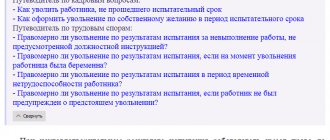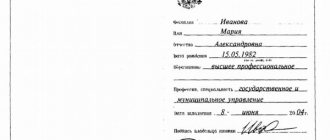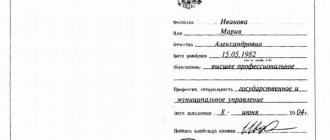What you need to know about the test
- The condition of checking the employee does not apply to the mandatory clauses of the labor agreement between the employee and the employer (Article 57 of the Labor Code of the Russian Federation).
- The main provisions are set out in Article 70 of the Labor Code of the Russian Federation.
- The condition of a probationary period when hiring is voluntary; no reservations are allowed. That is, if the employee does not want it to be present, it cannot be turned on unilaterally.
- During the period of qualification testing, the employee is subject to all norms of current legislation. The working employee does not have any privileges or restrictions during this period.
- If the document does not contain a provision on qualification testing, the person is hired without testing.
- In the event that an employee is actually admitted to work without concluding a contract, a test provision can then be included in the agreement only if, before admission to work, the employer has entered into a written agreement with this person on an appropriate test of skill.
In practice, it looks like this: a mechanic came to get a job, the foreman consulted with the employer and invited the candidate to make ten test parts. If the foreman has signed an agreement with the employee that the mechanic is actually allowed to work under the condition of a trial period of two months, then in the future the employment contract may contain a corresponding provision on probation. If you haven't signed, there will be no conditions.
- If the condition is present, it must be duplicated in the employment order in the appropriate column in the form of the T-1 form.
You can download a free sample employment contract with a probationary period of 2021 at the end of this material.
Probationary period and its duration
The employer often introduces a probationary period for applicants. This is explained by the fact that the organization’s management wants to make sure that the citizen meets the requirements for applicants. The procedure for introducing a probationary period is regulated by the Labor Code of the Russian Federation (Article 70).
A probationary period is a time period provided for checking a citizen’s qualifications. Based on the results of such a check, the applicant is either accepted into the organization’s staff or is refused.
Typically the trial period lasts no longer than three months. However, there are exceptions to this rule.
A probationary period of up to six months is provided for the following persons:
- management of the organization, branches, divisions;
- deputy managers;
- chief accountant;
- deputy chief accountant.
The Labor Code of the Russian Federation contains a list of categories of citizens for whom the probationary period is prohibited.
Such persons include:
- those employed on a competitive basis;
- planning to work at the place of employment for no more than two months;
- minors;
- pregnant women;
- elected to office;
- those who, after receiving a certificate of education or diploma, start working for the first time;
- invited to work by transfer from another organization.
If the citizen has passed the test, then there is no need to draw up a new employment contract. This means that he continues to work under the same conditions. If the employer is not satisfied with the results of the test, he has the right to terminate the employment relationship with the subordinate early.
The probationary period can only be approved by mutual agreement of the participants in the labor relationship.
If the applicant was not warned about the test, this qualifies as a violation of his rights. The citizen is not obliged to agree to the proposed period of testing; he can offer his own conditions.
Is a verification clause included in the contract?
Is the employment contract concluded for a probationary period? Of course yes. From the very beginning of a new employee's employment, the working relationship with him should be formalized.
Information about the existence of a trial period and its duration is indicated in the contract. If this condition is not present in the signed document, it is considered that the citizen was hired for the position without it (Part 2 of Article 70 of the Labor Code of the Russian Federation). The employer can reduce its duration, but increasing the probationary period established by law is unacceptable; such actions will be considered a violation of the terms of the concluded contract.
Maximum duration
The Labor Code, Federal Law No. 79 of July 27, 2004 determines the maximum permissible periods for various categories of workers.
| Duration of term | Employee category | Provisions of legislative acts |
| Up to 14 days | Employees who are hired on a fixed-term contract from 2 to 6 months | Part 6 art. 70 Labor Code of the Russian Federation |
| Up to 3 months | Employees for whom the legislator has not established other periods | Part 5 art. 70 Labor Code of the Russian Federation |
| Up to 6 months |
| Part 5 art. 70 Labor Code of the Russian Federation |
| From 1 month to 1 year | Persons who:
| Part 1 item 1 part 2 art. 27 Federal Law No. 79-FZ |
| From 1 to 6 months | Citizens (when appointed to a civil service position) who:
| P. 2, 3 parts 2 tbsp. 27 Federal Law No. 79-FZ |
IMPORTANT!
The trial period does not include the dates of the employee’s actual absence from work (Part 7, Article 70 of the Labor Code of the Russian Federation).
Extension of the probationary period under an employment contract
It is important that the law does not provide for the extension of the probationary period under an employment contract by amending it. The document is valid on the terms on which it was concluded. According to the text of the letter of the Federal Service for Labor and Employment dated March 2, 2011 No. 520-6-1, a probationary period for an employee is established only when hired for a production function stipulated by the agreement.
However, with mutual agreement and provided that the testing period has not yet ended, the parties have the right to draw up an additional agreement in writing, which indicates that the parties have agreed to extend the test within the period allotted by law (but not as an amendment to the original document ).
Thus, if an employment contract was initially concluded with Ivanov with a probationary period of two months, theoretically, with the consent of Ivanov himself and provided that this period has not yet expired, it can be extended for a maximum of another month.
Duration of the probationary period during employment
A sample employment contract with a probationary period differs from the standard document by indicating the trial period, which is established upon admission and is not permissible for an increase or decrease during the commencement of production activities. The time of the test depends on two factors: the duration of the employment contract and the position of the employee.
The dependence is presented in the table:
| Validity period of the concluded agreement | Position held according to the staffing table | Test deadline |
| Up to two months | Does not depend on position | Not provided |
| From two months to six months | Two weeks | |
| From six months to five years | 3 months | |
| Heads of legal entities and their deputies, chief accountants, chief executives and deputies of separate divisions (branches and representative offices in other regions) | Six months | |
| Indefinite form | Hired personnel with the exception of management personnel | 3 months |
| Managers, deputies and chief accountants of parent enterprises and structural divisions | Six months |
The minimum period is not defined by law, the maximum - in the open-ended form is limited to a quarterly period, for management persons - to a six-month period.
Download: Sample of a fixed-term employment contract with a probationary period (19.2 KiB, 387 hits)
Employment contract with a probationary period. Blank (60.0 KiB, 325 hits)
The term is calculated solely by the time of work, and not the time spent on staff. If an employee is absent from the workplace for a good reason, then in order to make a verdict on completion, periods of being on vacation, on sick leave, etc. should be excluded conditionally.
For example, an employee has a probationary period of 2 months, during which the citizen was on a temporary disability certificate for 1 month. Then, for final conclusions and the actual completion of the test, he must work for another month according to the tabulation, which will amount to 3 months of actual presence on the payroll.
Categories not subject to qualification testing
- Elected by competition to fill the corresponding position.
- Pregnant women and women with children under one and a half years old.
- Under the age of eighteen.
- Those who have received secondary vocational education or higher education and are entering work for the first time in the acquired specialty - within one year from the date of receiving vocational education.
- Those elected to an elective position (paid work).
- Invited to work by way of transfer from another employer as agreed between them.
- Those who have entered into an agreement for a period of up to two months.
- Successfully completed an apprenticeship with a given employer.
Labor contract
Labor contract
No. number from DD.MM.YYYY
| Soligorsk |
Organizational and legal form and corporate name, represented by the full name and position of the person authorized to sign an agreement acting on the basis of the Charter (for the director of a legal entity) or power of attorney No. [] dated [DD.MM.YYYY] (for a representative of a legal entity persons) Individual entrepreneur, represented by the full name of the individual entrepreneur acting on the basis of a certificate of state registration No. certificate number from the date of issue of the certificate (“Tenant”), on the one hand, and
Semenov A.V. (“Employee”), on the other hand, collectively referred to as the “Parties” and individually as a “Party”, have entered into this employment contract (the “Contract”) as follows.
1. Subject of the contract
1.1. This Contract governs the labor relations between the Employer and the Employee.
1.2. The employee performs labor duties (functions) in the customer service department of the Employer in the position
engineer for inventory of buildings and structures on the terms determined by this Contract.
1.3. The Employee’s place of work is the Employer’s office located in Unknown.
1.4. Work under this Contract is the main place of work for the Employee and part-time work.
1.5. The Employee reports to the Director of the Employer, and in his absence to the person replacing him (“Management”). The employee is also obliged to follow the orders of other persons indicated by immediate superiors or the Director of the Employer.
1.6. An employee is hired for a job with a probationary period of Unknown duration without passing a probationary period.i
2. Duration of the contract
2.1. The employee starts work with DD.MM.YYYY.
2.2. The Contract comes into force from the date of its signing by both Parties.
2.3. This Contract is concluded for a period of 1 to 5 years up to DD.MM.YYYY inclusive.
3. Rights and obligations of the parties
3.1. The employee has the right to:
3.1.1. providing him with work stipulated by this Contract;
3.1.2. a workplace that meets the conditions provided for by state standards and labor safety;
3.1.3. timely and full payment of wages in accordance with their qualifications, complexity of work, quantity and quality of work performed;
3.1.4. rest provided by establishing normal working hours, providing weekly days off, non-working holidays, paid annual leave;
3.1.5. complete reliable information about working conditions and labor protection requirements in the workplace;
3.1.6. protection of your labor rights, freedoms and legitimate interests by all means not prohibited by law;
3.1.7. compensation for harm caused to the Employee in connection with the performance of his labor duties, and compensation for moral damage in the manner established by the labor legislation of the Republic of Belarus;
3.1.8. compulsory social insurance in cases provided for by the legislation of the Republic of Belarus;
3.1.9. amendment and termination of this Contract in the manner and under the conditions established by the labor legislation of the Republic of Belarus.
3.2. The employee is obliged:
3.2.1. personally perform the labor function defined by this Contract in accordance with the instructions attached to this Contract (Appendix 1);
3.2.2. conscientiously fulfill his labor duties assigned to him by this Contract;
3.2.3. comply with the Employer's internal labor regulations and other local regulations of the Employer, as well as the provisions of current legislation directly or indirectly relating to his work for the Employer;
3.2.4. observe labor discipline;
3.2.5. comply with labor protection and occupational safety requirements;
3.2.6. treat the property of the Employer and other employees with care, the Employee bears full financial responsibility for damage caused to the Employer through the fault of the Employee as a result of improper use and storage of material or monetary assets, their theft, destruction;
3.2.7. comply with the trade secret regime established by the Employer and not disclose information constituting a trade secret, the owners of which are the Employer and its counterparties, and which became known to the Employee in connection with the performance of job duties;
3.2.8. notify the Employer about changes in your personal / credentials and provide, within Unknown working days from the date of such changes, original documents related to changes in passport data, registration data about the place of permanent residence and / or temporary stay, contact phone numbers, marital status, relationship for military service, for recognition as a disabled person and the establishment of a disability group, for obtaining the right to a pension, etc.
3.3. The full list of other labor rights and obligations of the Employee is determined by legislation, other regulatory legal acts, local regulations of the Employer and management acts of the direct manager and (or) Director of the Employer, which do not contradict the labor legislation of the Republic of Belarus.
3.4. The employer has the right:
3.4.1. encourage the Employee for conscientious, effective work;
3.4.2. demand from the Employee the performance of his labor duties and careful attitude towards the property of the Employer and other employees, compliance with the internal labor regulations;
3.4.3. bring the Employee to disciplinary and financial liability in the manner established by the legislation of the Republic of Belarus;
3.4.4. adopt local regulations;
3.4.5. move the Employee or transfer him to another job, in the manner and under the conditions established by the legislation of the Republic of Belarus;
3.4.6. amend and terminate this Contract in the manner and under the conditions established by the legislation of the Republic of Belarus.
3.5. The employer is obliged:
3.5.1. provide the Employee with the work stipulated by this Contract;
3.5.2. ensure labor safety and conditions that meet occupational safety and health requirements;
3.5.3. provide the Employee with equipment, tools, technical documentation and other means necessary to perform his job duties;
3.5.4. pay the full amount of wages due to the Employee within the time limits established by the labor legislation of the Republic of Belarus and this Contract;
3.5.5. provide for the Employee’s household needs related to the performance of his job duties;
3.5.6. carry out compulsory social insurance of the Employee in the manner established by the legislation of the Republic of Belarus;
3.5.7. compensate for harm caused to the Employee in connection with the performance of his duties, as well as compensate for moral damage in the manner and under the conditions established by the legislation of the Republic of Belarus.
3.6. The list of other rights and obligations of the Tenant is determined by law and local regulations of the Tenant.
4. Terms of remuneration. Social insurance and welfare
4.1. The Employee's monthly salary consists of a tariff rate (salary) in the amount of Unknown Belarusian rubles. rub., and increasing the tariff rate
(salary)i in the amount of Unknown white. rub. Thus, the Employee’s salary is set at Unknown Belarusian rubles. rub.i
4.2. The Employer may periodically review the amount of Salary to adjust it taking into account the Employee's job responsibilities, performance and potential.
4.3. The employee may be paid bonuses in the manner and under the conditions established by the current local regulations of the Employer and legislation.
4.4. The Employee bears full financial responsibility for damage caused to the Employer through the fault of the Employee by excessive cash payments (except for cases of accounting error), incorrect accounting and storage of material or monetary assets, their theft, or destruction.
4.5. Any incentive payments in accordance with this Contract may be paid by the Employer only if the Employee complies with the Internal Labor Regulations.
4.6. The Employer has the right to reduce (deprive) the Employee of bonuses of all types, regardless of disciplinary action for:
4.6.1. absence from work without a valid reason;
4.6.2. untimely performance or failure to fulfill job duties without good reason;
4.6.3. use of the Tenant's property for purposes other than business.
4.7. Payment of wages is made once twice a month in cash in Belarusian rublesUnknown. Unless otherwise agreed, Salary is paid Unknown of the current month Unknown of the next month, advance – Unknown of the current month, the rest of the salary – Unknown of the next month. If the timing of payment of wages coincides with public holidays, public holidays or weekends, it must be made on the eve of them.
4.8. The salary is paid to the Employee at the place where he performs the work or is transferred to the Employee’s bank account opened by him in a bank with which the Employer has an agreement stipulating the conditions and procedure for the Employer to transfer funds to the Employee. Primary expenses for opening and maintaining accounts necessary for servicing bank cards, namely for the initial issuance (issue) and use (fees for maintaining an account and making payments on the card for the first year of service) of bank cards are borne by the Employer.
4.9. During the period of validity of this Contract, the Employer:
4.9.1. withholds income tax from individuals and other taxes, fees, insurance contributions from wages and other payments to the Employee in accordance with the legislation of the Republic of Belarus. With respect to personal income tax, the Employee is responsible for compliance with all requirements of the current legislation of the Republic of Belarus and any other tax jurisdictions to which the Employee is subject. At the time of signing this Contract, the Employee hereby confirms his compliance with these requirements;
4.9.2. on a general basis carries out compulsory social insurance with the payment of insurance contributions to the Social Protection Fund of the Ministry of Labor and Social Protection of the Republic of Belarus and insurance against industrial accidents and occupational diseases at the expense of the Employer in the manner prescribed by the legislation of the Republic of Belarus;
4.9.3. may provide voluntary insurance to the Employee at the expense of the Employer.
5. Work and rest schedule. Working conditions
5.1. The employee is assigned the number of hours (in wages) - hourly number of days (in wages) dailyi
work week. The Employee’s work and rest schedule, including the start and end time of the working day, breaks for rest and food, is determined by the Internal Labor Regulations.
5.2. The employee has the right to basic paid leave - amount
calendar day/s during the year.i
5.3. The employee is provided with additional incentive leave for the contractual form of labor relations for the duration of
calendar day/days.i
5.4. An employee may be granted additional leave in the manner established by local regulations and legislation of the Republic of Belarus.
5.5. The Employer has the right to reduce the Employee's vacation in the corresponding year by the number of days of absenteeism or intentional failure to perform work duties for more than three hours during a working day without good reason. In this case, the vacation must be at least 24 calendar days.
5.6. The Employee’s working conditions meet safety and hygiene requirements.
6. Guarantees and compensation
6.1. For the period of validity of this Contract, the Employee is subject to all guarantees and compensations provided for by the current labor legislation of the Republic of Belarus and local regulations of the Employer.
7. Professional training
7.1. The Employer provides advanced training, professional development and training in an adequate amount based on the position and experience of the Employee and in accordance with the requirements of the current legislation of the Republic of Belarus. The employer has the right, at his own discretion, to determine the need and forms of professional training and education. In this case, the Employer enters into separate agreements with the Employee on the conditions of training/internship.
7.2. The Employer conducts certification of the Employee at least once every three years, unless a different period is established by the President of the Republic of Belarus.
8. Modification and termination of the contract
8.1. This Contract is terminated due to the expiration of its term and on other grounds provided for by the legislation of the Republic of Belarus and this Contract.
8.2. The Contract is terminated, among other things, when:
8.2.1. violation of labor protection and safety rules resulting in injury or death of another employee;
8.2.2. infliction of property damage to the state, legal entities and (or) individuals in connection with the performance of labor duties, established by a court decision that has entered into legal force or a decision on bringing to administrative liability adopted by another authorized state body (official);
8.2.3. drinking alcoholic beverages, using narcotic or toxic drugs during working hours or at the place of work;
8.2.4. occurrence of other grounds provided for by labor legislation.
8.3. The contract can be terminated early:
8.3.1. at the initiative of the Employer on additional grounds provided for by law, for failure to take, without good reason, within the period established by legal orders of law enforcement or control authorities, measures to eliminate identified violations, as well as to compensate for material damage caused to the state as a result of violation of current legislation;
8.3.2. at the request of the Employee in the event of non-fulfillment or improper fulfillment of the terms of the Contract due to the fault of the Employer. In this case, the Employer pays the Employee for the deterioration of his legal situation the minimum compensation provided for by the labor legislation of the Republic of Belarus.
8.4. This Contract may be terminated early in the manner and in cases provided for by this Contract and the labor legislation of the Republic of Belarus.
8.5. If the Employee decides to terminate this Contract, he/she notifies his/her immediate superior in the manner and within the time limits established in accordance with the labor legislation of the Republic of Belarus. The employee has the right to receive payment for any accrued but unused and not yet expired vacation days.
8.6. Upon termination of the Contract by either Party, regardless of the reasons for such termination, the Employee agrees that he/she will return all property to the Employer, including, without limitation: all confidential materials belonging to the Employer, including manuals, books and records, as on paper and in computer form; confidential and other materials belonging to the Employer's clients or suppliers, including working documentation, dossiers, materials provided by suppliers (all such materials - both on paper and in computer form); and all other materials and property of the Employer, including personal property purchased and/or provided by the Employer, as well as items such as accessories, identification cards, accreditation cards and work permits, corporate credit cards, computers, computer supplies, and office supplies goods and office equipment.
8.7. All changes and additions to the Contract are formalized by written agreement of the Parties. All additional agreements to the Contract are an integral part of it.
8.8. In all cases of termination of the Contract, the day of dismissal of the Employee is the last day of his work.
9. Intellectual rights to proprietary results of intellectual activity
9.1. This article of the Contract governs the relations of the Parties related to the rights to the results of intellectual activity subject to legal protection, created by the creative work of the Employee in the performance of his labor function.
9.2. In this Contract, Service Objects (depending on the situation also: service work, service performance, service invention, service utility model, service industrial design, service topology of an integrated circuit or service production secret) mean all works, performances, inventions, utility models, industrial designs, topologies of integrated circuits, production secrets, which are objects of intellectual rights in accordance with the current Belarusian legislation, which were created by the Employee in the performance of his work duties or a specific assignment of the Employer within the limits of the work duties established for the Employee and meet all the conditions of protectability imposed on such objects.
9.3. The Employer has the following rights to Service Objects:
9.3.1. the exclusive right to an official work or official performance belongs to the Employer in full from the moment of creation of such an official work or official performance;
9.3.2. the exclusive right to a service invention, service utility model or service industrial design, and the right to obtain a patent for such Service Objects, belongs to the Employer;
9.3.3. the exclusive right to the service topology belongs to the Employer in full;
9.3.4. The exclusive right to an official secret of production belongs to the Employer in full.
9.4. Additional remuneration for the Employer’s use of a Service Object created by the Employee independently or in collaboration is not paid to the Employee by the Employer.
9.5. The Employee agrees to: (1) the use of the Service Object created by him by the Employer without indicating his name as the author for each such use, including when making a work public, publishing information about an application for an invention and publishing information about the issuance of a patent for an invention, utility model, industrial sample, (2) use of the Service Object created by him under any name, at the discretion of the Employer, (3) making, at the discretion of the Employer, any other changes to the Service Object created by him.
9.6. The Employee does not have the right to independently use, including sell, the Service Object or part thereof, as well as dispose of the rights to the Service Object or part thereof, including the right to obtain a patent.
9.7. The right of ownership to the material medium (thing) in which the Service Object is expressed belongs to the Tenant.
9.8. The Employee is obliged not to disclose information that constitutes a trade secret of the Employer and its counterparties, and not to use this information for personal purposes.
9.9. The Employee is obliged to transfer to the Employer upon termination of this Contract the material media in the Employee’s use containing information constituting a trade secret.
10. Personal data
10.1. The Employee agrees that processing, including receipt, storage, combination, transfer or any other use of the Employee’s personal data received by the Employer in connection with this Contract, will be carried out by persons authorized by the Employer in the manner established by the Employer.
10.2. The Employee agrees to the transfer by the Employer of the Employee’s personal data to third parties who provide the Employer with services related to personnel management and ensuring compliance with tax, labor and other laws.
10.3. The employee undertakes not to disclose the personal data of other employees.
11. Other conditions
11.1. The terms of this Contract are confidential and are not subject to disclosure without the mutual consent of the Parties.
11.2. The Employee and the Employer are responsible for failure to fulfill and/or non-compliance with obligations under this Contract in accordance with the current legislation of the Republic of Belarus.
11.3. Disputes arising between the Parties are subject to settlement through negotiations; in case of failure to reach an agreement, they are considered at the jurisdiction established by the current legislation of the Republic of Belarus, at the location of the Tenant.
11.4. In all other respects related to the subject of the Contract and not provided for by this Contract or not fully regulated by it, the Employee and the Employer are guided by the norms of the current legislation and local regulations of the Employer.
11.5. The invalidity of one or more conditions of this Contract does not entail the invalidity of the entire Contract as a whole.
11.6. This Contract is drawn up in two copies having equal legal force, one for each of the Parties.
| The employee is familiar with/passed | date | Employee's signature |
| Internal labor regulations | DD.MM.YYYY | |
| Introductory training on labor protection | DD.MM.YYYY | |
| Introductory training on the rules of protection and handling of trade secrets | DD.MM.YYYY |
| Employer | Worker | ||
| Organizational and legal form and corporate nameIndividual entrepreneur Full name of the individual entrepreneur | Full name: Semenov Alexander Vasilievich | ||
| Address: address | Registration address: st. Red 5 | ||
| UNP UNP | Passport: MP1234567 | ||
| Account number Account number | issued by Moskovskoye District Department of Internal Affairs of Minsk on June 25, 2015 | ||
| in the bank name | |||
| bank code bank code | Social insurance certificate: no. | ||
| bank address bank address | |||
| On behalf of the Tenant | Worker | ||
| ___________ | ____________________ | ___________ | ___________________ |
| signature | full name | signature | full name |
| seal | |||
Termination of an employment contract during the probationary period
An employee may terminate an employment contract during a probationary period. In this case, he must notify the employer about this in writing three days before dismissal. The calculation starts from the next day, which was preceded by the notice of dismissal.
It is also possible to terminate an employment contract during a probationary period at the initiative of the employer, without waiting for the end of the stated period; the main thing is to notify about this in writing three days before dismissal. At the same time, it is important to indicate in the notice the real and justified reasons that served as the basis for dismissal. You need to be prepared for the fact that the employee will go to court, which will evaluate and make a decision on the validity or unjustification of termination of the agreement solely on the basis of the documents that the employer provides to the court. If the court considers that the employer did not provide sufficient documentary evidence to justify the termination of the contract with the employee, the court will decide to reinstate the employee at work.
Employment contract for a probationary period (sample 2020)
Sample employment contract with an individual entrepreneur for a probationary period, 2021 (with the seller)
Mistakes made by employers when applying for a probationary period
The employee disputes the unsuccessful test in court.
If the court finds errors, the employee will be reinstated or the wording in the work book will be changed to an entry of his own free will. The employer will be required to compensate wages and moral damages.
It turns out that due to mistakes, the entrepreneur is obliged to hire an incompetent person.
Article: employer's responsibility to employee
Dismissed people sue quite often. Therefore, employers' mistakes are known. Let's talk about them using examples from court cases.
Fired after expiration of probation period
You cannot say on the last day of the probationary period: “You are not suitable for us.” The employee is given three days' notice of dismissal.
The beauty salon administrator was fired on the last day of the test. It turned out that she did not always bounce checks for clients. The employer thought that days off would count toward the deadline, but no. The administrator got his job back.
Case No. 33-10467/2017
The probationary period was not included in the employment contract
The lawyer was fired during the probationary period. He could not cope with the overlapping court hearings and ignored meetings.
In court it turned out that the employment contract with the lawyer was not signed. He worked under the order of admission - and they set up a test in him. But without an entry in the employment contract, there is no probationary period. The lawyer was reinstated.
Case No. 33-43726/2015
The employee was not familiarized with job responsibilities
The accountant did not pass the probationary period. The management did not like the fact that she calculated salaries with errors, was late with reports and did not know how to work with the 1C program.
In court, the accountant said that her responsibilities were not explained to her.
The court reinstated the woman at work, explaining the following. Each responsibility is explained to the employee. The job description is presented upon signature. And the employer must teach skills to work in 1C (!).
Case No. 33-7794/2015
The employer did not explain what was wrong with the employee’s professional suitability
When dismissing an employee, they explain in writing what he did wrong.
A construction worker was fired because his colleagues complained about him. The court said: “What does the professional qualities of the employee have to do with it?” There was no evidence of poor performance by the employer. The employee was returned.
Case No. 33-632/2013
A test was assigned to an employee who should not be tested
A fifth-year student was hired to work as an ecologist with a probationary period. A month later she graduated and became a young specialist. Such workers are not checked.
Something went wrong and the employee failed the test. The court reinstated her at work because the probationary period had become illegal.
Case No. 33-11672/2016
Check time
During the trial period, the newcomer is subject to all norms of labor legislation, as well as labor regulations adopted by the company. An employee also has the right to claim wages, sick leave, bonuses, and compensation. The probationary period is taken into account when determining the total length of service.
At the same time, during this period the employee is obliged to comply with the internal regulations of the organization, labor discipline and fulfill his duties in full. In case of violation, administrative measures may also be applied to subjects, up to and including dismissal. All this must be kept in mind before writing an application for probation .
If the newcomer has not mastered his duties during the probationary period, management has the right to dismiss him by notifying him three days before the end of the agreed period. In this case, no severance pay is paid. In addition, the employee has the right to leave on his own initiative, warning the employer in writing three days in advance. Also see “Dismissal during Probationary Period”.
If, at the end of the trial period, neither party has expressed a desire to terminate the employment contract, then its validity continues on a general basis. Also see “Rights of Probationary Employees.”
Sample application for a job with a probationary period
Labor standards do not provide for the need to indicate the existence of a probationary period in documents other than an employment contract and an employment order. However, when hiring, the applicant himself has the right to hint at this. Also see “Probationary Registration”.
Now let’s talk about how to write an application for a probationary period more correctly when applying. The document is drawn up in any form, but with a list of mandatory details:
- company name and full name the boss in whose name the document is intended;
- the place for which the applicant is applying;
- duration of the trial period;
- date of commencement of the employment relationship;
- your autograph and the day of filling.
Below is a sample application for a probationary period .
Read also
28.07.2016
What is it like?
Provisions of Art. 70 of the Labor Code of the Russian Federation allows for the possibility of establishing a trial period for a newly hired employee before starting work. At the same time, the acceptance of this condition must occur by mutual agreement. Therefore, applying for an appointment with a probationary period is the good will of the job seeker.
The introduction of a probationary period only at the request of the employer and without the knowledge of the applicant is unacceptable!
Another condition for the existence of a trial period is its inclusion in the provisions of the employment contract. Otherwise, the agreement has no legal force.
Before setting a probationary period for an employee, an employer must consider the following factors.
- Not all cases allow the possibility of using a probationary period.
- Duration of the trial period.
A similar condition is not stipulated for persons who started work as a result of elections, competitions, invited by transfer from other employers. The test is also not applied to women with small children under 1.5 years of age, pregnant women, minors, as well as to persons whose employment contract period does not exceed two months. These positions are mentioned in Art. 70 of the Labor Code of the Russian Federation, and the list is not exhaustive. Also see “Probation period: not determined for whom.”
For people who do not fall under the conditions listed above, the verification period should not exceed three months. Meanwhile, a period of up to 6 months is relevant only for management personnel: directors, chief accountants, heads of departments, deputies. Also see “Probationary Period for Managers.”
When concluding contracts for a period of up to six months, the duration of the trial period is a maximum of two weeks.
The test period is not established under other circumstances provided for by the Labor Code of the Russian Federation. This applies, for example, to citizens undergoing alternative civil service and to other categories.
Please remember that the minimum duration of any test is not specified by law. Meanwhile, it is limited by the maximum values. The structure of the [probationary application sample] should take this into account.







